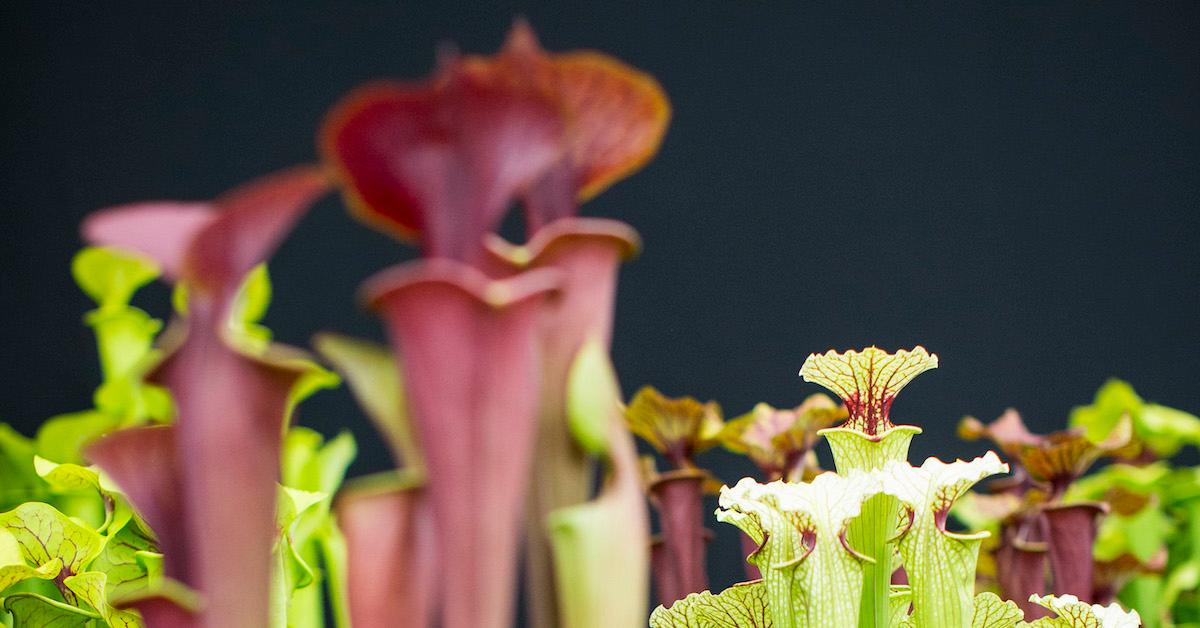Cambodian Officials Tell Locals to Stop Picking the “Carnivorous Penis Plant” for Selfies
Published May 18 2022, 11:50 a.m. ET
While picking a plant that resembles male genitalia, putting it in a vase, and presenting it to your lover may sound like a good idea, conservationists would beg to differ. Cambodian government officials are currently urging locals to stop picking a rare plant colloquially known as the “carnivorous penis plant,” which has become a popular selfie prop in the area.
As silly as it sounds, this is a serious conservation issue, and it could cause the plant — officially called the Nepenthes bokorensis, and also referred to as the Cambodian pitcher plant — to go extinct.

Sarracenia hybrids, another form of pitcher plants, at the Chelsea Flower Show on May 23, 2016 in London, England.
Cambodia is asking people to stop touching the carnivorous penis plant.
In May 2022, Cambodia’s Ministry of Environment took to Facebook to shed light on this issue. The official government Facebook page shared a few photos of young women in a field, cheekily posing with handfuls of pitcher plants they had just picked from the ground.
And, as you can see, the plants resemble male genitalia when photographed from specific angles.
However, the Ministry of Environment was not simply sharing the photos for a laugh — the department included a caption warning people to stop picking these plants, however funny it may be to them. According to a translation, the caption reads: “What they are doing is wrong and please don't do it again in the future! Thank you for loving natural resources, but don't harvest so it goes to waste!”
But what exactly is this plant, and why is it so important?
The carnivorous penis plant is actually the ‘Nepenthes bokorensis.’
Cambodian news outlet the Khmer Times identified the plant as the Nepenthes holdenii; however, Live Science reported that that is incorrect. According to the website, which conferred with two experts on the matter, the phallic plant in question is actually Nepenthes bokorensis, which is closely related to the holdenii.
As with any other plant, picking a Nepenthes bokorensis out of the ground kills it. As more and more people pluck these from the ground, the unique species grows closer to dying out.
According to the Journal of the Australasian Carnivorous Plant Society, The N. bokorensis feeds primarily on ants, as well as insects. So, the less Cambodian pitcher plants that are in the ground, the more insects there will be, which could disrupt the balance of the local ecosystem.
Furthermore, humans picking the N. bokorensis is not the only thing that is contributing to its decline. As noted by Live Science, a 2021 study published in the Cambodian Journal of Natural History looked at the plant and its natural habitat. The study found that the growing agriculture and tourism industries in Cambodia have hurt the N. bokorensis’ natural habitat, which of course furthers the species’ decline.
The ‘Nepenthes bokorensis’ Cambodian pitcher plant is Critically Endangered.
The Cambodian Journal of Natural History study also concluded that both N. bokorensis and N. holdenii should be classified as Critically Endangered, judging by the criteria of the IUCN Red List.
So considering that, locals should really respect their local pitcher plants — but that doesn’t mean photoshoots are out of the question.
"If people are interested, even in a funny way, to pose, to make selfies with the plants, it's fine," botanical artist François Mey, who is Cambodian and Vietnamese, told Live Science. "Just do not pick the pitchers because it weakens the plant, because the plant needs these pitchers to feed."
You heard the expert — you can look, just don’t touch.
